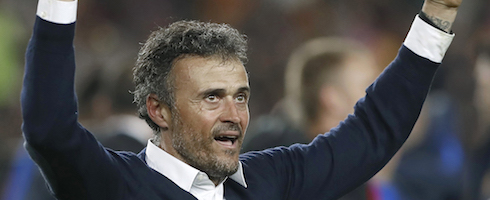It may seem madness to criticise a side whose last Champions League outing resulted in Europe’s greatest-ever comeback. Written off after their initial 4-0 loss at Paris Saint-Germain, Barcelona achieved the impossible, quite literally shaking Europe through the resultant celebrations and the occurrence of a minor earthquake in the Catalan capital. Yet, the two-legged affair was a fantastic example of the club’s evolution under Enrique – and for many fans it’s been for the worse.
“[Johan] Cruyff built the cathedral. It is our job to maintain it,” Pep Guardiola once said of Barcelona, making reference to the Catalan club’s intrinsic link with total football. Under the Manchester City boss, Barca were a passing machine – a side that bullied the opposition by simply not letting them have the ball. Midfield dominance was pinnacle to that, with Leo Messi linking effortlessly in a false nine position.
Undoubtedly, Barca have evolved under Enrique. They now keep the ball for longer in defence, with the midfield trio moving further forward and into wider areas. Direct passes to the trident and more rapid attacking transitions have become cornerstone tactics of the new Barca.
The tactical changeover wasn’t immediate, however, and when Barca faced Juventus in the 2015 Champions League final, they were still largely playing ‘the Guardiola way’ – evident by Ivan Rakitic’s opener, which capped the sort of passing move that was considered textbook Blaugrana.
On top of that, the full-backs were vitally important. The attacking Dani Alves and Jordi Alba provided natural width and were a constant outlet for their midfielders – something proven statistically as they joined Messi in the top three for passes completed against Juve. Just behind them were the midfield trio of Rakitic, Andres Iniesta and Sergio Busquets.
The stats mark a stark contrast from Barca’s recent rollercoaster with PSG, with Gerard Pique (74), Javier Mascherano (74) and Samuel Umtiti (73) heading Barca’s top three for passes completed. In fact, Pique and Mascherano made over double what Iniesta (35) and Rakitic (35) managed on the historic night. Such figures have been replicated in La Liga this season, with the defensive trio averaging far more passes than their midfield counterparts.
There are those that criticise Enrique for drifting too far from the Barca way, referencing a loss of identity. For them, therefore, evolution has become synonymous with regression. However, evolution is often essential in football.
Under Guardiola, and later Tata Martino, Barca had become too predictable. Teams capable of organising a strong defensive line, and with effective counter attacking options, could cause serious damage – proven for instance by Chelsea in 2012 and Atletico Madrid in 2014.
A change was necessary, and initially for Enrique it worked, his side winning the treble in the first season and then the double. Yet it seems once more that teams have figured the Catalans out. Those brave enough to press them high have been rewarded this season, including the likes of Celta Vigo, Man City and most recently Deportivo La Coruna.
One area where Barca have faltered in recent years is in recruitment, with the likes of Paco Alcacer, Andre Gomes and Aleix Vidal struggling and still no recognised right-back. Strength in depth is thus perhaps more of an argument for regression than a change in on-field ideology. After all, with a new boss incoming in the summer, the Barca way will once again be under scrutiny.

